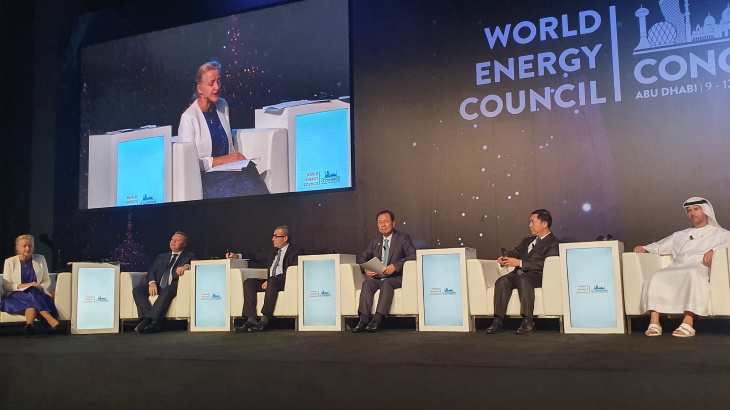The session A new dawn for nuclear energy? was moderated by World Nuclear Association Director General Agneta Rising.
Opening the discussion, Rising said that nuclear energy, complemented by other low-carbon sources, "must play a central role if we want to shift to a clean, affordable and reliable electricity system". She noted that the global nuclear industry has set itself the ambitious target to construct an additional 1000 GWe of reactors before 2050 so that nuclear has a 25% share of total electricity generation. "To ensure that we can deliver this, we need to remove some barriers," she said.
Kirill Komarov, first deputy chief executive of Russian state nuclear corporation Rosatom and chairman of World Nuclear Association, said nuclear energy has "not only a bright and brilliant future, but a very good existing situation". He noted that last year, nine new nuclear power reactors, with a combined capacity of 10 GWe, were commissioned. At the same time, construction of five more units was launched. A total of 55 new reactors are also at different phases of construction.
On public perception, Komarov said the industry needs to convince people that nuclear power plants are safe and can be a solution to decarbonisation. "I am very optimistic about the existing situation because we see more and more countries ready to join the nuclear club," he said.
Public perception is not fixed and impossible to change, he said. "It depends on the work of the nuclear community to explain to people what we are doing, to convince them that without nuclear power we will not achieve decarbonisation goals."
The industry's ability to complete projects on time and to budget also needs to be addressed. Serial construction, he said, is the solution to this.
Xavier Ursat, executive director of EDF Group, said the biggest battle currently faced by mankind is the fight against climate change, but we are not yet winning that fight. There are two ways of producing clean electricity, he said, renewables and nuclear.
"Never, if we are sincere in the fight against climate change, should we put renewables against nuclear," he said. "It should be renewables plus nuclear, or we will not win the fight. Renewables and nuclear are very complementary."
To improve public acceptance, he said the industry needs to find a way to explain what nuclear electricity actually is - that it is a natural and not an artificial process. He also noted the time to implement nuclear projects is too long at 10-15 years between the decision to construct a plant and its commissioning.
Jong-kap Kim, president and CEO of Korea Electric Power Corporation, agreed that public acceptance is critical to the industry's future. He said governments have to be consistent with their nuclear policies. Public support for nuclear energy in the UAE increased from just 5% in 2011 to 94% in 2018 because the government has been very transparent and consistent, he added.
Mohamed Al Hammadi, CEO of Emirates Nuclear Energy Corporation said clarity of policy and strategy from the government is the "overriding driver for success". He noted that the UAE government had published its energy roadmap in 2008 and has adhered to it closely ever since. Nuclear technologies are proven, economically viable, safe and clean, he added.
China National Nuclear Corporation President Gu Jun said public communication on nuclear in China had been difficult following the Fukushima Daiichi accident in Japan. "Before the accident, people mainly supported nuclear power, but afterwards incorrect information from the media made people afraid of nuclear energy," he said.
Stricter safety standards were introduced following the Chernobyl, Three Mile Island and Fukushima Daiichi accidents while regulatory requirements have been tightened. This has made it more difficult for the industry to control construction costs and timescales, he said.
In her closing remarks, Rising said the status of nuclear energy was changing. "We see more intergovernmental organisations mentioning nuclear's part in the future ... It is now becoming clearer how important it is for a stable and affordable electricity system to have nuclear."








_94566.jpeg)






